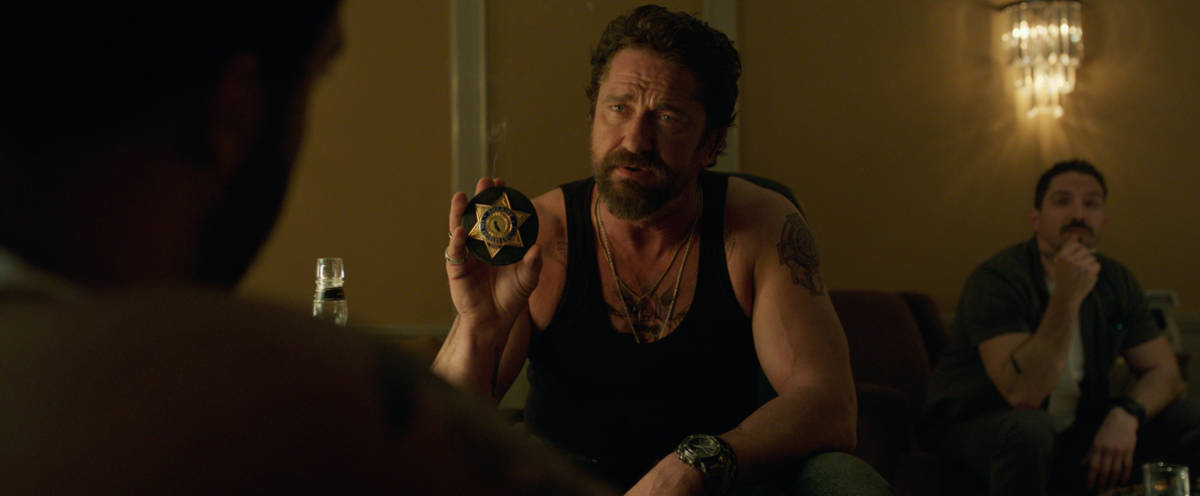I suppose Den of Thieves should be congratulated. No movie has ever inspired me to hate men, if only for a few hours, but by god, Den of Thieves did it. It is a kind of achievement.
This movie certainly needs all the points it can get. At an overstuffed 140 minutes, it far overstays its welcome, with a plot that insults the audience’s intelligence at every turn, and some of the most egregious examples of toxic masculinity I’ve ever seen in a modern movie.
We begin with a group of armed, masked men trying to hijack an armored car. After things go bad, they get into a shootout with police, killing many and successfully escaping with the car, severely displeased that, as cop killers, they’ve just painted very large targets on their backs.
They’re very correct. Next we meet the man taking aim at them, LA Sheriff Nick Flanagan (Gerard Butler). Within ten minutes, he’s soon revealed to be every maverick cliché ever. He cracks wise, argues with the FBI guy (who they take care to mention is a vegan), is cavalier about the rules of a crime scene…you know, just so we know he’s plays by his own rules and no one else’s. However, his disregard for the law and order he is seemingly pledged to uphold is revealed when he kidnaps a member of the robbery crew (O’Shea Jackson Jr. of Straight Outta Compton) in order to get information about their next move.
“I am a member of a gang,” Butler boasts in one of the movie’s more offensive bits of dialogue. “Only we have badges.” It’s expected that the subsequent interrogation will get rough, but it quickly gets horrific when Flanagan puts Jackson in a chokehold, bringing visions of real-life police brutality to mind. Attempts to reassure us, such as frequently cutting to the lone black member on Butler’s team to show that he’s totally okay with this, only make it worse.
Granted, this is from the guy who wrote and directed London Has Fallen, so high art, or even basic art, is hardly to be expected. But Den of Thieves goes far beyond plotholes and laughable clichés. The movie’s marketing has revolved around the depiction of these two groups as very opposing sides of the same coin, but when many of the killers, such as 50 Cent’s Levi Enson, are depicted as less toxic and more kind to their families than Butler actually is, where is the reason to invest in the so-called good guys? Especially when those good guys engage in the kind of behavior that routinely make real-life headlines and don’t seem accountable to any sort of authority or basic rules whatsoever.
Flanagan, and especially the robbery crew’s leader Merrimen (Pablo Schreiber) are supposed to be two brilliant minds squaring off, but it’s hard to see any evidence of that when they engage in the kind of idiotic behavior that serves no purpose other than as dick-measuring contests. Butler practically reveals that he’s turned Jackson into an informant, and shows up at various other places where Schreiber happens to be. He might as well be holding up a huge sign saying, “I am on to you!” How is any of this police work, and why does Merrimen follow through with his plans to rob the unrobbable Federal Reserve when Flanagan clearly knows what he’s planning?
Then there’s the gender issue. Toxic masculinity is built on the bodies of women, and they get the worst of it here. Every female member of the cast feels so disposable that calling them stereotypes would be an upgrade, so relegated are they to their status as building blocks for the image Den of Thieves desperately wants to uphold for its men. Here the best women can expect is to be property males feel honor-bound to protect until they are in the hands of other males. Butler’s wife and daughters are used to make him more sympathetic, various strippers and whores are placed where the movie deems it appropriate (and that is very often), and Merrimen even asks a stripper to have sex with Flanagan in order to…get his cell phone number? Oh, then he has sex with her himself after. It makes one wonder if he isn’t given a more sympathetic treatment because he hasn’t conformed to the standards for a good man by having a family himself. Lastly, there are the women who are deemed unfuckable, and thus relegated to comic relief.
There are moments of genuine humor that serve as far too brief respites, as well as one genuinely unexpected development. But it would take a miracle on the level of the Second Coming to save this movie. If there is any purpose to its existence, it’s as an unwitting, chilling reminder of just how far we still have to go.
Some of the coverage you find on Cultured Vultures contains affiliate links, which provide us with small commissions based on purchases made from visiting our site.

